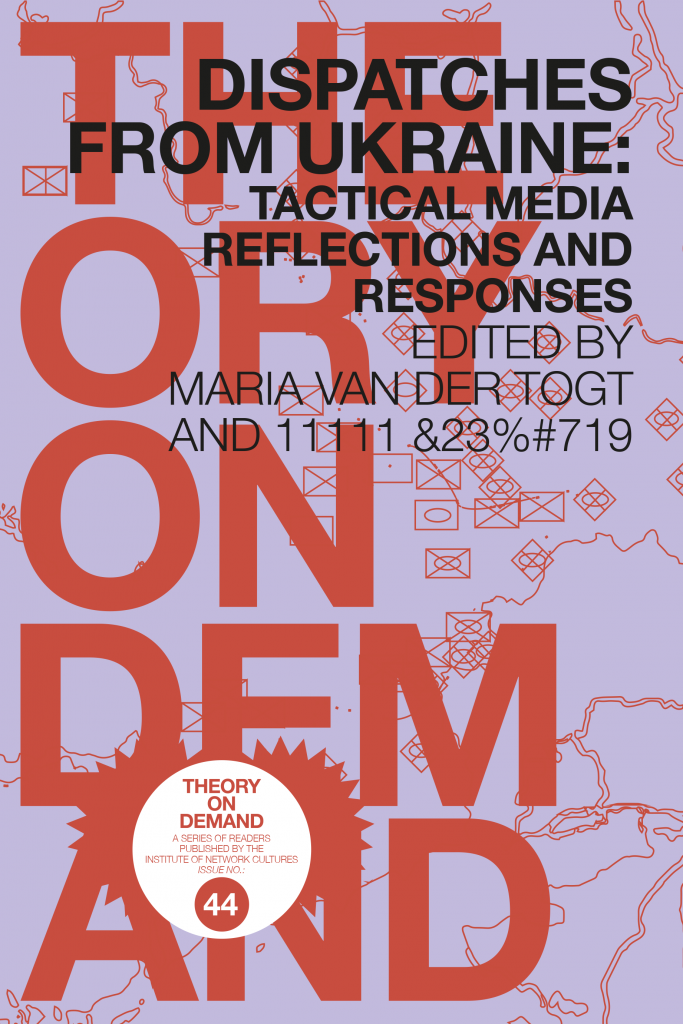Dispatches from Ukraine: Tactical Media Reflections and Responses

Editors
Maria van der Togt and 11111 &23%#719
Contributors
Elmaz Asan, Franco ‘Bifo’ Berardi, Andrii Dostliev, Lia Dostlieva, Olexii Kuchanskyi, Karyna Lazaruk, Geert Lovink, Lera Malchenko, Svitlana Matviyenko, Maria Plichta, Ellen Rutten, Sander Steffann, Marc Tuters, Michał ‘rysiek’ Woźniak.
This publication marks the first results of the Tactical Media Room Ukraine project, launched in February 2022 in Amsterdam after the shocking Russian full-scale invasion of Ukraine. Tactical Media Room is a network of activists, journalists, scholars, and artists linked by the exchange of ideas and practices—all aimed at supporting Ukrainian media and confronting Russian state propaganda. Together, the network of experts initiated a screening and a series of meetings that took place mainly in Amsterdam. Based on these meetings, Dispatches from Ukraine: Tactical Media Reflections and Responses showcases initiatives, critique, and essays that provide insights into the ways information circulates in time of war.
This edition also aims at overcoming the Eurocentric approach through inviting Ukrainian journalists, artists, and thinkers to share their observations and personal experience of living through war in the digital age. It allows the collected reflections to be grounded and situated within the certain context of Ukrainian, Belarusian and Russian long-lasting conflicts. While on the one hand, perspectives on info-war and the array of urgents matters at a distance are presented, on the other hand, this publication also focuses on what is missing from outside of the war-zones.
All the featured authors track the effects of a warfront intertwined with the digital realm. Networks are never merely tools. These hyper-sensitive environments are subjected to constant mutation; formed by the negotiations of people (s) and institutions. Questioned, destroyed, argued, and sublimated through an ever-growing information stream.
The publication starts with insights into the public programs organized by TMR in the past months and introduces some of the initiatives of its members. The series of meetups opened with a public discussion in the Makers Guild at Waag Society between Belarusian activist from the Belarusian opposition movement in the Netherlands Ilya Shcharbitski, an analyst in the Ukrainian office of Argus Media Victoria Dovgal, and the publisher of The Moscow Times Alexander Gubsky. Together, they exchanged their experiences with disand misinformation produced by Russian propagandist media before and during the 2022 war. According to Dovgal, the most powerful tool to fight propaganda and disinformation is education, which is an especially urgent issue due to an insurmountable number of educational institutions that have been bombarded in Ukraine since February. To support the point about the importance of education, Ellen Rutten, whose essay is also included here, presented the initiative—the University of New Europe—that aims at helping scholars at risk from the region.
The second meetup was a special solidarity screening conducted with the Emergency Support Initiative of Kyiv Biennial and HomeCinema. The screening featured a series of works filmed by moving image artists based in Ukraine. All of the works were created in February and spring 2022, giving a raw and immediate insight into the filmmakers’ current practices. The films blatantly remind us of the importance of filmmaking in times of crisis and the necessity to make visible and keep traces as acts of resistance. The list of the featured artists is published in this Theory on Demand.
The third meetup organized by TMR extended initial debates between two camps— the Internet Freedom supporters, who stand for freedom of expression, and the Freedom of Press followers, who insist on propaganda censorship. For this publication, Maria Plichta wrote a report on the debate that happened in the Amsterdam academic debating centre Spui25 on June 30, 2022, highlighting the most prominent points and arguments. All together, the descriptions and reflections on the TMR meetings make up part one of this publication.
The name of the second part, Informational Export, stems from Sophia Kornienko’s analysis of the stances upon which propaganda is built. In her essay, Sophia states that the main source of Russian export is ‘the idea that there is no truth.’ The articles that follow denounce, in one way or another, the way information circulates in the digital age embraced by war. Italian theorist Franco ‘Bifo’ Berardi discusses how the ongoing war that Russia initiated in Ukraine is different than other wars and what role fake news and politically charged information play in it. This essay is followed by the text of TMR members Karyna Lazaruk and Marc Tuters who elaborate on fake news and so-called ‘open source intelligence’ OSINTtechnologies and the way in which they are appropriated by propagandist media. Michał ‘rysiek’ Woźniak explains why the analysis of fake news should not be limited to focusing on legislation only. ‘We should instead be looking closely at how it is possible that it spreads so fast (and who benefits from this),’ he says. ‘We should be finding ways to fix the media funding crisis; and we should be making sure that future generations receive the mental tools that would allow them to cut through biases, hoaxes, rhetorical tricks, and logical fallacies weaponized to wage information wars.’ Lia Dostlieva and Andrii Dostliev address the ways in which culture is being utilized as a powerfull tool of state propaganda in ‘Not All Criticism is Russophobic: on Decolonial Approach to Russian Culture.’ The article questions what Russian voices can bring into public discussions and offers guides for a non-imperialistic way of thinking and acting. Part two ends with the speech by Elmaz Asan, a Ukrainian jounalist and a representative of the indigenous Crimean Tatar people, delivered at ‘The European Internet Blockade of Russian Propagandist Media’ event at Spui25 in which she touches upon the colonial nature of Russian journalism and propaganda.
Part three consists of essays united under the title ‘War Mentality/Digitality’, which provides a personal account of the war and its seepage into the digital—zooming in on digital war tactics, but also on the experience of a war largely observed and mediated through the online. Svitlana Matviyenko and Geert Lovink reflect on the origin and wider context of the diary Svitlana has been publishing since late February 2022 on the Institute of Network Cultures website. Before the Russian invasion started, Geert contacted Svitlana to ask her how she was estimating the large scale Russian exercises and build-up at the border. On February 21 she responded: ‘I have been writing a diary since early January. I call it Dispatches from the Place of Imminence, in which I am trying to reflect on the situation, and particularly, the cyber warfare side of it.’ In the text ‘Digital Leviathan and His Nuclear Tail: Notes on Body and The Earth in The State of War,’ Olexii Kuchanskyi describes a corporeal experience of war through a united and multiple body, where the body functions as ‘a network of relationships and interactions’, and as ‘a tension between the individual and its environment.’ Lera Malchenko text, “I Notice the Extension”, is a nod to Marshall McLuhan’s Understanding Media: The Extensions of Man. She dissects the boundaries of a body as it gets increasingly intermixed in a complex heterogeneous system as a result of war. The section ends with one of Svitlana Matviyenko’s Dispatches From the Place of Imminence. In this particular entry from the diary series (part 10 from May 31, 2022) she unpacks imperialist epistemology through media theory and political analysis, carefully interlacing the subject with personal accounts of the absurd and the banal.
The publication rounds up with a list of sources and Initiatives to Support Ukraine, Ukrainian Refugees, and People at Risk.
Order a copy or download this publication free of charge at http://networkcultures.org/publications.
